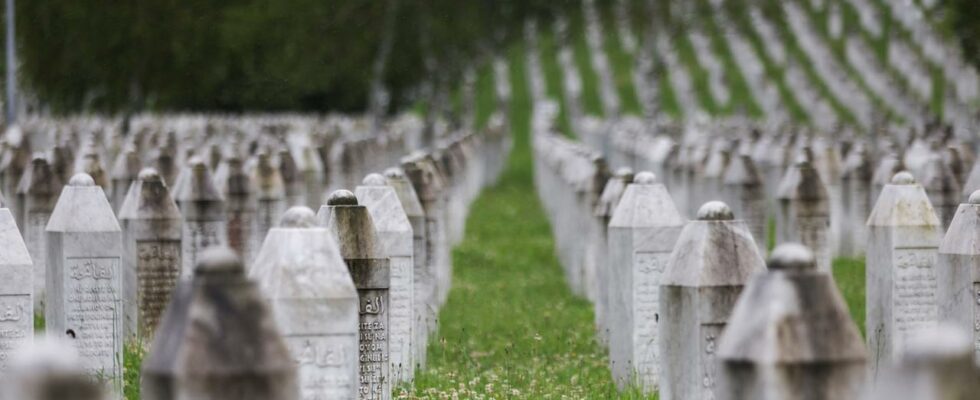The UN General Assembly is to vote on an international day of remembrance for the 1995 Srebrenica genocide. Bosnian Serb politicians still deny the genocide to this day. She also outrages the UN vote.
More than 8,000 Bosniaks were murdered in the area within a few days in July 1995 by Bosnian Serb troops under Ratko Mladic. Most of the victims were men and boys. In the future, an international day of remembrance will be held every year on July 11th to commemorate the crimes. This is one goal of the resolution that Germany and Rwanda want to introduce in the UN General Assembly today.
The High Representative of the international community in Bosnia is the German politician Christian Schmidt (CSU). He sees the significance of the resolution as follows: “The resolution reminds us that we must never forget this genocide, this crime that was committed against people.”
Denial is the order of the day
The resolution calls on UN states to preserve the facts about the genocide and condemns the denial of the genocide and the glorification of the perpetrators. This is apparently too much to ask of some politicians in Bosnia and Serbia. Denial or trivialization of the genocide is the order of the day here – and usually goes unpunished. The mayor of Srebrenica, Mladen Grujicic, is one of the politicians who do this.
But Milorad Dodik, the president of the Serb-dominated part of Bosnia, Republika Srpska, also spreads false claims: “Everything surrounding Srebrenica is based on a lie. They have never proven the fact that 8,300 people were killed – neither through funerals in Potocari (Note: Village near Srebrenica) nor through court rulings. There is nothing.”
Dodik is threatening to split Republika Srpska from Bosnia. Serbian members of the central government in Sarajevo are also mocking the victims in their own country.
Just a few days before the vote in New York, for example, Bosnian Interior Minister Nenad Nesic of the Bosnian Serb DNS party appeared on Serbian television and told a tasteless joke. “If you’ll allow me to tell a joke about a father’s funeral in Potocari: They asked little Mujo (Note: contemptuous of Bosniaks)to give his father’s personal details. He says: ‘Born in Sarajevo, buried in Srebrenica, lives in Germany.'”
Classifications as genocide in 2004 and 2007
International court rulings refute such false statements. The UN Tribunal for War Crimes in the Former Yugoslavia (ICTY) classified the Srebrenica massacre as genocide in 2004. The International Court of Justice followed in 2007; a trial between Bosnia and Serbia in which it was determined: Serbia was not directly involved in the genocide. But it also did nothing to prevent the massacre.
The UN resolution also does not assign Serbia any blame for the crimes. Nevertheless, Bosnia’s neighboring country is vehemently resisting the resolution. President Aleksandar Vucic traveled to New York earlier this week to persuade states not to vote for it.
“Based on the statements of the highest representatives of the Sarajevo regime, we understood that everything has only one goal: the claim for damages, payment of war reparations and a new revision of the existing ruling of the permanent International Court of Justice in The Hague,” said Vucic.
Vucics Misinterpretation
International law experts reject Vucic’s account as unfounded. The resolution has no legal consequences. The supporting states also tried to refute the Serbian arguments in the run-up to the vote.
The former Yugoslav Republic of Montenegro, for example, introduced a preamble. The content: Genocides cannot be attributed to entire ethnic, religious or other groups. Vucic had repeatedly claimed that the resolution should be used to accuse the Serbs collectively as a people of genocide – which, however, is not mentioned in the resolution.

